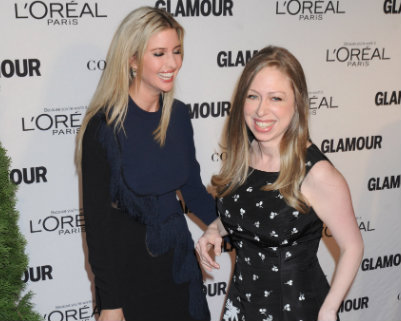The Presidential Election is Literally Destroying Friendships
One in 14 people say they have ended a friendship because of Clinton vs. Trump.

Chelsea Clinton and Ivanka Trump reportedly have remained close friends during this election season, even as their parents have been battling it out on the campaign trail.
If only the rest of America were so lucky.
A new poll from Monmouth University shows that the heated, ugly and thankfully-almost-over campaign is fraying the human bonds that hold society together. Things have gotten so bad that 1 in 14 Americans have ended a friendship because of a political disagreement during this electoral version of Celebrity Death Match.
Perhaps due to the schism within the Democratic Party exposed by Bernie Sanders' primary campaign, more Clinton supporters (9 percent) than Trump supporters (6 percent) say they have lost friends during the campaign.
Monmouth also reports that 70 percent of those polled said they believe the presidential election has brought out the worst in people. Only 4 percent say the election has brought out the best in people—and that seems a bit high, doesn't it?
If you're having the urge to end a friendship because one of your acquaintances is going to vote for Hillary Clinton, Donald Trump, Gary Johnson or Jill Stein (or Kanye West), here's some friendly advice: don't.
For starters, that person's vote doesn't matter any more than yours does—which is to say, neither counts for much at all, as Reason editor in chief Katherine Mangu-Ward explained in detail four years ago.
No, that vote isn't going to throw the election to the candidate you can't stand, either.
Instead of clicking "unfriend" over something as meaningless as a vote, try to remember that our differences are what really make us interesting. Ask yourself if you'd really like to spend your whole life surrounded by the talking heads of your preferred cable news station in a bubble of perpetual agreement—or within the cozy confines of a news feed that reinforces your beliefs and filters out the rest.
If none of that works, try focusing on the similarities instead of the differences—and when it comes to Trump and Clinton, there are plenty of those. Both want to run up more debt, and neither is serious about ending America's role as policeman of the world. That's just the start.
"What if the first priority of both is not to decrease the size and scope of government but to expand it?" asks Judge Andrew Napolitano. "What if they both believe that the federal government may lawfully and constitutionally right any wrong, tax any behavior and regulate any event? What if they both want to add a few thousand new employees to the federal payroll, give them badges and guns and black shirts, and engage them as federal police to insulate the federal government further from the people and the states?"
See, your Clinton/Trump supporting friend is actually more like your Trump/Clinton supporting self than you might have thought.
Of course none of this emotional therapy would be necessary if the presidential race didn't matter so much that people would be willing to throw away friendships over it. It would surely improve our interpersonal relationships if the country didn't have to go through an all-the-eggs-in-one-basket, nothing-will-ever-matter-as-much-as-this electoral slugfest once every four years.
Like, say, if the president's authority was limited in some way, maybe by a set of written rules? Guidelines, even.


Show Comments (358)